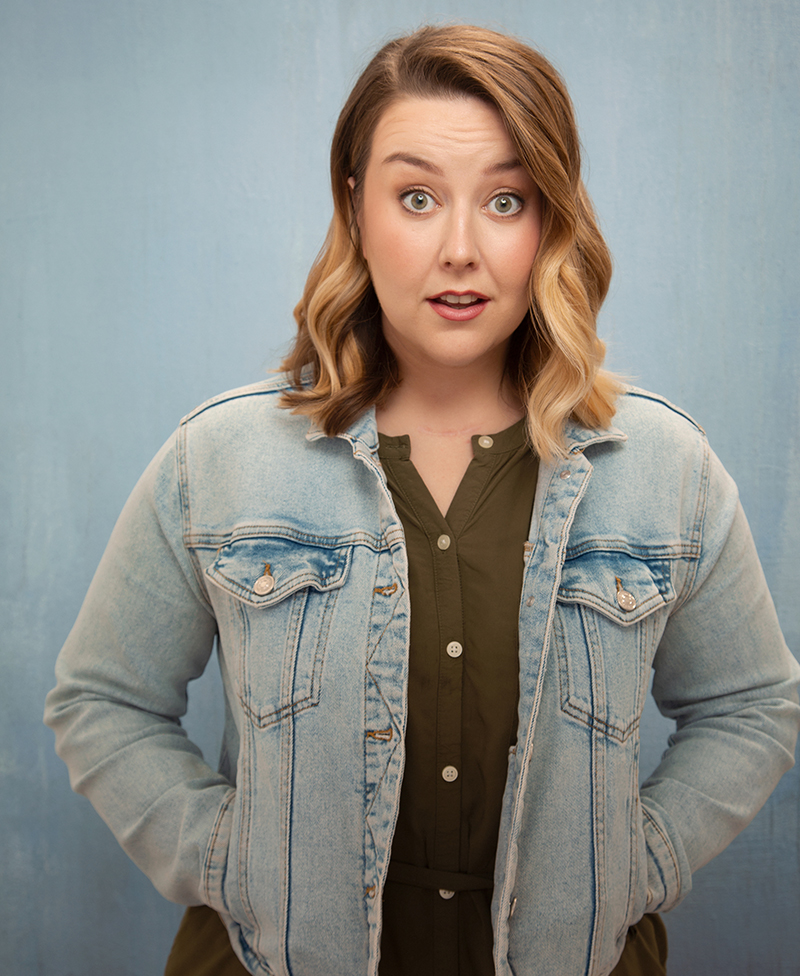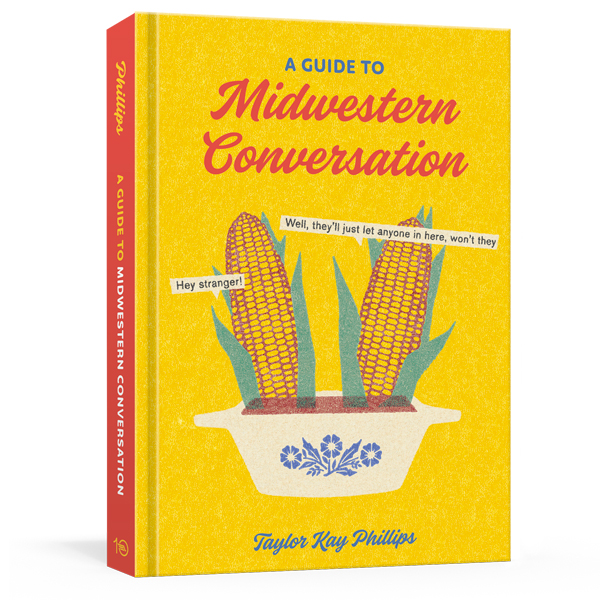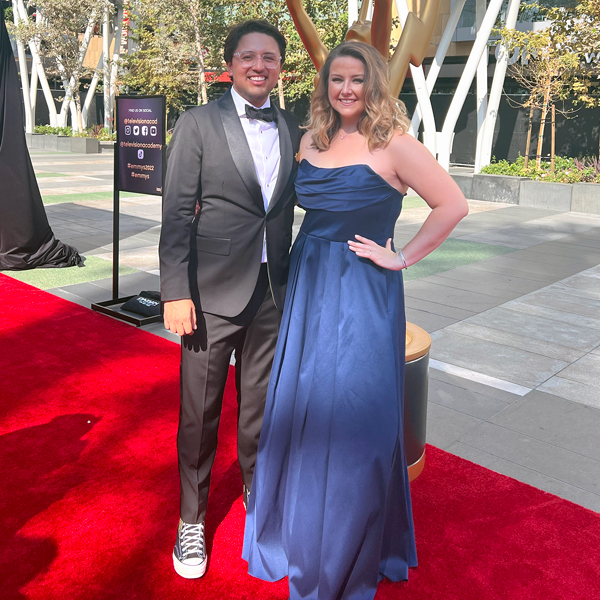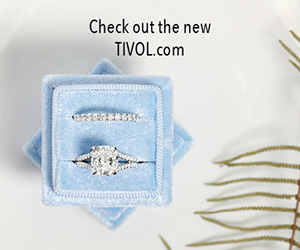
Standing in front of Rockefeller Center on a family vacation, 10-year-old Taylor Kay Phillips, born and raised in south Kansas City, promised herself she would live in New York City one day.
Now the 29-year-old Phillips not only has a sunny apartment in Harlem, but also a golden statuette of a winged woman holding an atom over her head to decorate the place. In September, Phillips won an Emmy for her work as a writer on HBO’s Last Week Tonight with John Oliver.
The win for Outstanding Writing for a Variety Series was the seventh in a row for the show, which beat out Saturday Night Live, A Black Lady Sketch Show, The Daily Show with Trevor Noah, and The Late Show with Stephen Colbert, which Phillips’s husband, Felipe Torres Medina, writes for.
Phillips, who also does standup and sketch comedy, has a humorous book coming out in April 2023, A Guide to Midwestern Conversation (Ten Speed Press).
In a telephone call from New York, Phillips chatted with IN Kansas City about what she misses about her hometown, one way that Harlem is like Kansas City, and how she applies her comedic style to writing jokes for John Oliver.
Tell us a story about you as a kid.
Hmmmm. So, it’s been very, very sweet in these recent couple of months with people hearing about the Emmy and my book—I’ve had some people who were adults in my life when I was a kid, reaching out and telling me some things about myself that I don’t remember.
Like what?
My sister is two-and-a-half years younger than I am, and we had two babysitters when we were kids who were also sisters. We called them the Herbers girls, and the best part of our week was when the Herbers girls were coming over.
One of them recently told a story that one time when I was two or three my teddy bear got sick, and we were doing surgery on my bear, and I looked at her with tears in my eyes and said, “I don’t think there’s anything else we can do for him.” [Laughs.]
Another time in summer they were watching us, and we went to the grocery store and we got stickers. They said, “You’re going to write a book and illustrate it with the stickers.” We would dictate what we wanted the story to be, and they would write it down.
I got horse stickers and ballerinas, so I made up a story about circus girls who were horse ballerinas. One of them got kidnapped and when they went into the kidnappers’ house, I wanted readers to encounter something scary, to know that this guy was bad news. Two things had recently happened in my life: I had gotten very, very into the Wizard of Oz, and I had started reading an illustrated storybook series about presidential assassinations. So, when these circus girls walked into the courtyard of the kidnapper, they found themselves face-to-face with a bust of John Wilkes Booth.
How old were you then?
I know that I was seven, because the characters in the book were eight. Anytime I played make-believe, I always wanted the character to be one year older than I was.
So young Taylor was always ready to be one year older.
Yes! But I wasn’t trying to be too much older. I just wanted whatever that next thing afforded.
How often do you get back to Kansas City and what do you miss about it when you’re not there?
I come back for Thanksgiving, and I get back two or three times a year at least. My parents still live in the house I grew up in. I lived there my whole life, we never moved. So, home is just such a specific place for me there. There’s no ambiguity about it. My preschool is walking distance from the house, my high school, middle school, elementary school—Barstow—is walking distance.
But also, what I love now, going back as an adult, is: It’s a cool city! One of my best friends lives in the River Market. I never went to the River Market when I was a kid, and it’s beautiful, and there are breweries. I love the Truman Library. And I was in New York when I heard Buck O’Neil got into the [Baseball] Hall of Fame, so I want to go back to the Negro Leagues Museum.
It’s always great to be back in the city, and there’s always more to see and to love and more shirts with “KC” and a heart to buy. [Laughs.] It really is everything.
When and why did you move to New York?
I went to college on the East Coast, to Harvard, so I was in Cambridge and Boston, and the summer between my junior and senior year I did an internship in Chicago at an advertising agency and took classes at Second City. It was so fun; an amazing summer. I lived with a friend of mine. It was a dream. And the advertising agency offered me a job after my internship and they said, “You can do it in Chicago or you can go to New York.”
And I thought, “That’s it. That’s how I’m going to be able to afford to move to New York.” Because when I was 10 years old, we came to New York on a family trip, and we went to 30 Rock and while we were standing there, I made myself a promise that I was going to live in New York someday.
What neighborhood do you live in?
I have lived in Harlem since I moved here. I love it. I moved here with a roommate from college, and we filled out an application for the first apartment we visited, and I turned the corner to go look at the apartment and there was a coffee shop right there. And I thought, “This has to be fake. There’s no way I could get to live two doors down from a coffee shop in New York City.”
Eventually my husband, who was my boyfriend at the time, moved into that apartment with me. It was a great first New York apartment, which means it didn’t cost a lot of money, and the landlord was decent, but there was no natural light and it was very, very small.
My husband writes for The Late Show with Stephen Colbert—he’s been there three years, so he got his job long before I got my job. In the middle of the pandemic we got married, and my friends sent an espresso machine, just a little one. And my perfect husband was like, “Where are we going to put this? We can’t live here anymore, it’s too small.” He grew up in a city, but I grew up in a house in Missouri and then went straight to college, so I thought, “Dorm rooms are what apartments are: small and uncomfortable.” And he was like, “It doesn’t have to be this way.”
Luckily, we found a beautiful bigger apartment with natural light three blocks away.
With room for the espresso machine.
Plenty. We have two coffee machines and a pour-over. We are all set on the caffeine front. And it’s still in Harlem. Harlem is a lot like Kansas City in that it’s a beautiful, historical place where you can learn more about everything if you just have curiosity. There are beautiful trees that change color and all the kids are cute and there are lots of great dogs.
When Covid hit in 2020 you had not yet gotten your big break into TV writing. What was your life like at the ad agency during the pandemic?
It was the perfect day job for someone like me. It was creative and cool, and they were so flexible. I worked on commercials and tweets for hospitals and finance tech—things that were a little bit more chill in the ad world. I wasn’t writing Nike commercials. They wasted no time moving us all to remote, and copywriting for advertising is something that transitions easily to remote. Also during the pandemic, I sold my book, and the agency gave me leave to write my book.
I think that is something that gets lost in conversations about how to break into this [TV writing] industry is what a unicorn it is having a wonderful day job working for decent humans.

You have said that success is about 85 percent hard work and 15 percent luck, but the 85 percent has to come first. Your long resume of standup, sketch comedy, and writing credits demonstrates that you did the work. I’m curious to hear about the lucky bits.
I mean, the thing about luck for me is, you don’t know your lucky moments until they’ve already happened.
Can you give us an example?
Sure. The woman who put me up for this job—who put my name on the list to submit a packet for Last Week Tonight—I met her at an event that I only got a ticket to because someone else’s husband got sick.
That’s straight out of a movie.
You know what I mean? Of course, then I had to go straight away and write the copy.
And you were ready because you had done the work.
One hundred percent.
Last Week Tonight is different than other late-night shows because the segments contain a lot of reporting. Who does the reporting and who does the joke writing?
So, I can’t talk a lot about the inner workings of the show. What I can say is that being a part of it is that we all get to learn and explore and give input, and it really stretches me individually as a writer to be able to think in a lot of different ways: When is the moment for a joke? When is the moment to let something settle? How on earth am I going to make a joke out of this?
Sometimes the joke comes because I have something I want to say, and sometimes it’s because I want to push myself to a new level, and sometimes it’s just because “that’s your job, so I don’t care if you want to or not today.” Nobody says that to me, of course. I say that to myself.
Your comedic style is quite different from John Oliver’s. He swears more and has a more combative delivery. Is writing for him like sketch comedy where you’re writing in a character’s voice instead of in your own voice?
As someone who’s written scripts and who’s also written as myself, I feel that every joke I write comes from me. It just depends sometimes which side of me it comes from. First of all, I also certainly curse. I’ve made it 19 minutes on this call now without cursing because my mom told me to mind my manners.
Thank you for sharing that. When I was reading a lot of your stuff online, I was struck by how incredibly nice you sound.
For a while my Twitter bio said, “So nice in New York City, cutthroat bitch in the Midwest.” Because in New York, everyone is like, “Oh my, you bubbly thing. How do you do this?” And in Missouri, they’re like, “Taylor only talked to me for seven minutes. I think she’s mad, and the city got to her.”
I also think that with regard to Last Week Tonight, as a bubbly girl from the Midwest, I have thoughts other people might not have, and I think that’s valued.

Helton Walker, a reporter for Barstow School, asked you in a recent video interview if you had a billboard what it would say. Your answer was, “So, just to be clear…?” What does that phrase mean to you?
I think something that was different in my upbringing than in a lot of environments I find myself in—on the coasts, in entertainment, online—is that in Missouri you do grow up with and directly interact with people who think and feel and experience all different kinds of things.
Increasingly it seems to me like people don’t always understand the full implications of what they are saying. It happens to me, too, so I’m grateful to have my sister and my mom and my husband and my in-laws and my friends, who say to me, “So, just to be clear—this is what you are saying.”
Something that I’ve always found both funny and important is to repeat back to people what they are putting out there. I think that’s what John does and our jokes do. I also think people are funny on their own. So, I love to say, for example, “OK, so you’re upset because what you wanted to happen happened exactly the way you wanted, but someone wasn’t wearing the right T-shirt.”
And also, I think it’s important to be able to say something ridiculous yourself and then stop immediately and say, “Oh my gosh, what did I just say?”
My sister and I very often when we’re about to say something potentially really vain or tone deaf will say, “I’m about to hear myself. . .” That’s a signal that the other person doesn’t have to respond with, “Do you hear yourself right now?” [Laughs.]
It also signals that I’m gonna say it anyway, like: “At the free lunch at work today, they didn’t have the salmon, and I really wanted the salmon.”
Interview condensed and minimally edited for clarity.


